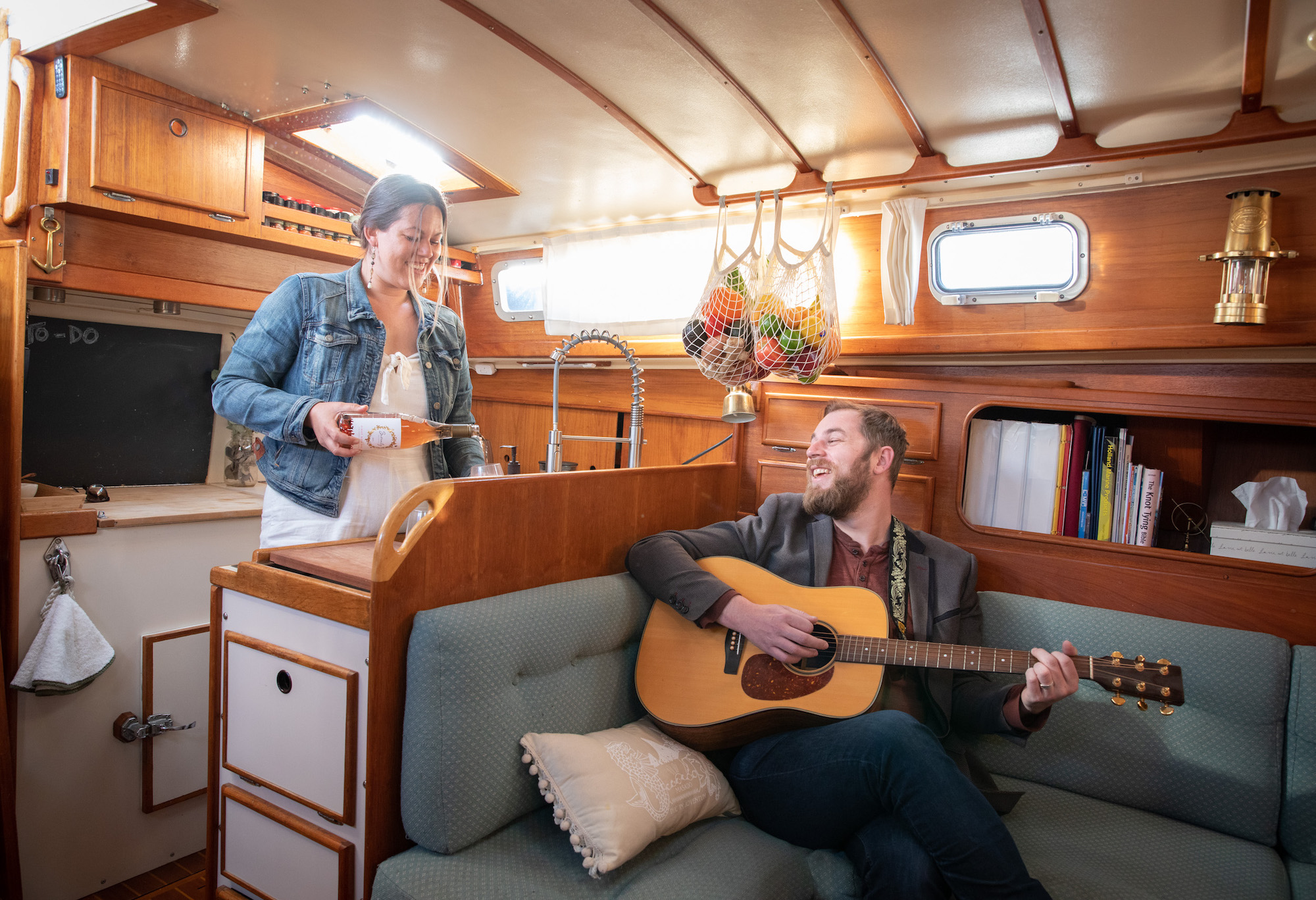This couple gave up their Leslieville semi and moved into a sailboat

Who they are: Talia Massé Dowd, a 33-year-old pilot, and Michel Savoie, the 36-year-old head of product management for a fintech company.
What they bought: 1983 Whitby 42 sailboat.
What it’s costing them: $2,700 per month, including $1,250 average docking fees (electricity, water, pump-outs and parking), $500 for maintenance, $150 in additional data for internet access, $100 for insurance, $175 for storage, $25 for a post office box and $500 for Michel’s rented office space.
Talia: Michel and I met on Tinder in January 2015. We were married in December 2017 and, instead of a honeymoon, we bought our first boat, a 1986 Mirage 35 sailboat. At the time, we were renting a 1,200-square-foot semi in Leslieville, and we loved sailing on weekends and the slower-paced lifestyle. During the summer, we spent all our free time on our boat, taking in some of the best parts of the city out on the water.
In July 2020, Michel was negotiating a new job, which would be based in Vancouver. I was working less than usual during the pandemic, and as a pilot I can commute to work from anywhere in the world as long as I can get a flight to get to the plane I’m scheduled to fly. Michel’s deal fell through, but it got us thinking: if we were looking forward to a big life change by moving across the country, why not just make a big life change here? That’s when we decided to move into a boat.


The Mirage was too small for us to live on and not properly equipped for winter, so I started looking for an upgrade. We wanted a boat that we could sail on the Great Lakes and, eventually, around the world. Soon I found the Whitby 42, which is locally built—in Whitby, naturally—and fit all our requirements. The interior is about 300 square feet, with a galley, saloon, two cabins and two bathrooms (which boat people call heads). It was move-in ready with a diesel furnace, battery bank, water tanks, hot water heater, a big refrigerator and plenty of headroom for Michel, who is six foot four. We made an offer at the end of August and decided to move in a couple of months later.
We ended the lease on our Leslieville home and got rid of 75 per cent of our belongings like clothing, kitchen equipment, art, our TV and all of the furniture. It was challenging, but it was also incredible to pull everything out and realize how little you actually need. We found it easier to move during the pandemic because there weren’t as many distractions to take up our time, so we ended up doing a lot of boat work while in lockdown. We renovated the heads, remodelled the galley, replaced lights, built shelves, refinished wood and sewed new curtains for the 16 windows.


The fresh water tank is 1,200 litres, which is about two and a half weeks’ worth of hot showers as well as cooking, cleaning and drinking water. The toilets suck up lake water but the waste gets stored in a tank, which we empty every two weeks. In the winter, there’s a septic truck that comes by to pump us out, and in the summer, we take the boat to a specialized pump-out dock at our summer home, the National Yacht Club.
We spent the pandemic winter in the boat at Port Credit Harbour Marina. It wasn’t too bad. We had three space heaters that kept the temperature consistently between 20 and 22 degrees. We also have a diesel furnace if the temperature dips further. At one point, the marina froze over, so we had our own skating rink. We kept our distance from others and played hockey. For work, Michel rents an office space on Bay Street, but sometimes he’ll take a Zoom call from the boat. The people on the other end of the line are usually pretty surprised and ask about all the wood in his background. They think what we’re doing is novel and unique.


Pretty much everything we own is on this boat. In such a small space, it gets messy very fast, so we constantly have to organize and reorganize. And there’s constant maintenance—in a water environment, everything degrades more quickly, so there’s always maintenance to keep all the moving parts in good working order and keep our home afloat. It’s a major challenge. We do a lot of the fixing ourselves because there’s either no one who does that work or it’s extremely costly, but the upside is we’re learning more about how the boat functions, so we’ll be able to handle it in the future.
I love how close we are to nature, and we’re very in touch with the weather. We’re more aware of when the wind picks up or changes direction because the boat heels over and we can hear the lines creaking. We’ve seen ducks have their ducklings and spotted a beaver and a bald eagle, too. Watching the wildlife and the seasons change is an absolute pleasure.


It took us a while to get used to the idea that we’re not tied to a geographic place anymore. Our home can go wherever we want to go. We’re starting with a trip to the Thousand Islands this summer. We’d love to explore Eastern Canada next year, and head down the east coast. In five years, we hope to make it all the way to Barbados. We started an Instagram account where we’ll be documenting our journey.
We plan to live here indefinitely, even if we have kids. I don’t think that will stop our plans or force us to move back to land. It’ll be tight, and I don’t know what we would do with all the toys, but this boat has two bedrooms and two bathrooms. There’s plenty of space.











